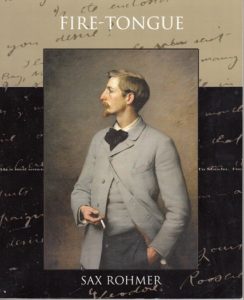Book Review: Fire-Tongue by Sax Rohmer
If there’s one thing a detective hates, it’s when their client hems and haws about explaining basic details of why they need a detective, only to die just as they make up their minds with only a cryptic last utterance as a clue.
But that’s the situation Paul Harley is in with his latest case. Sir Charles Abingdon, noted osteologist, suspects he may be in danger, but is so vague about the circumstances that it’s impossible to tell why. He promises to make more explanations at dinner, but collapses just after drinking a bit of water, uttering only “Fire-Tongue…Nicol Brinn” before passing.
Nicol Brinn is an American millionaire who happens to be in London just now, but what possible connection could he have to Sir Charles? And the phrase “Fire-Tongue” is a complete mystery. Oh, and neither the water nor the glass itself were poisoned, so how did Sir Charles die?
Brinn appears to know something about “Fire-Tongue” but is evasive at best on that matter, and claims to know nothing about Sir Charles’ death or why he might have felt threatened. He does promise to let Harley know if he has any definite leads. Very suspicious.
However, Harley learns that Sir Charles’ daughter, Phyllis “Phil” Abingdon has been receiving “attentions” from Ormuz Khan, a Middle Eastern banker. And since certain features of this case suggest the “Oriental”, that’s worth looking into as well.
Readers familiar with Sax Rohmer’s work will fnd little mystery here. Once there’s a “mysterious Oriental” in the case, it’s obvious he’s guilty somehow. From there on in it’s secret societies, poisons unknown to Western science, subtle mental powers and lots of peril.
This isn’t Rohmer’s best work by a long shot. He divides the role of hero up between three male characters poorly, has characters make stupid decisions to keep the happenings mysterious, and the backstory is given in four straight chapters of infodump at the end. Exciting but incoherent.
And that’s before we get to the racism, sexism and making the villain effeminate in appearance to indicate that he’s somehow unnatural. Perhaps the weirdest bit in this direction is that Brinn’s face is repeatedly described as “Sioux-like” without any indication of Native American heritage.
This is, by the by, the second Paul Harley book; the first, Bat Wing, was apparently more of an actual mystery. Mr. Harley is an ex-barrister who has turned to political consulting and detection as a more interesting career. He’s apparently psychic, able to detect auras of evil or danger. Which would be more helpful if this sense were directional, and didn’t sometimes interfere with his ability to make rational observations.
Like many pulp heroes, Mr. Harley is also a master of disguise. Pity the baddies were specifically looking for someone in disguise!
Mr. Brinn is a harder-edged sort, and rather cold-blooded. He has a sense of honor that allows him to dally with other men’s wives, but not break his word. It’s a good thing he’s a millionaire, or he’d never get away with this stuff.
And then we have Detective Inspector Wessex of Scotland Yard, a bright (but not too bright) fellow who fills in chapters when neither Mr. Harley nor Mr. Brinn is available on-screen.
Overall, only recommended to Sax Rohmer completists. It’s in the public domain in the U.S.–my copy was from a print on demand publisher, but you should be able to find the text on the internet.

